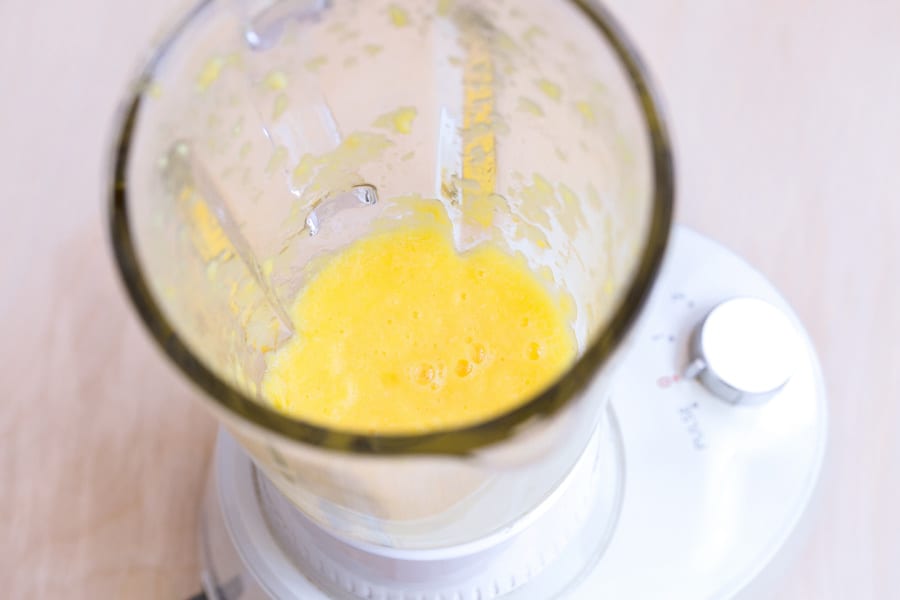Let’s face it: nothing shouts ‘breakfast’ like a glass of orange juice. It’s sweet, refreshing, and packs a lot of nutrients, including protein, iron, vitamin C, potassium, folate, vitamin A, and magnesium.
You can buy orange juice in wide varieties at thousands of grocery stores in your area, but it’s more exciting and satisfying to make your own orange juice at home. You can use a blender, a slow juicer, a citrus juicer, etc., to make a fresh juice.
This post will look at these methods of how to make orange juice, help you select the best oranges for juicing, provide you with exciting orange juice recipes, etc.
Let’s get started!

Orange juice health benefits
Fresh squeezed orange juice is sweet and downright delicious, but is it good for you? The simple answer to this question is a big yes.
Eating fresh oranges directly from the orange tree helps build your immunity and enhance your overall health. The fruits are high in vitamin C, which boosts immunity in individuals – both kids and adults.
Oranges are also known for balancing the hormones and stimulating the production of collagen that enhances your skin. Likewise, homemade orange juice helps balance LDL (bad cholesterol) and HDL (good cholesterol) by decreasing LDL and increasing HDL.
Like other citrus fruits, oranges are acidic but create an alkaline effect after metabolizing the juice. But if you suffer from ulcers, high blood pressure, diabetes, and digestive problems, too much orange juice isn’t good for you.
Homemade orange juice is bright, sweet, and healthy and cannot be compared to bottled juice. And although eating an orange is more nutritious than drinking its juice, most people prefer the juice because it’s delicious and refreshing.
Note: Despite its high nutritional value and health benefits, experts recommend that you limit your consumption (especially the juice with added sugars) because of its high sugar content.

Fresh-squeezed vs. store-bought juice
I know we’ve mentioned it above, but it bears repeating: no store-bought or bottled juice will ever come close to fresh-squeezed juice. Store-bought pure orange juice contains a lot of added sugar and less vitamin C.
Also, most commercial brands remove the pulp from the juice, which removes minerals and vitamins. On the other hand, homemade orange juice has all these healthy nutrients.
What are the different varieties of oranges?
The juice should be healthy and filling regardless of the type of oranges you use. Sweet oranges include varieties like Navel Oranges, Valencia, but Clementine, Blood Oranges, Tangerines, and Mineola also make perfect orange juice.
Of course, orange varieties will have different flavors and natural sweetness, but this comes down to individual personal preferences. Valencia oranges have the best flavors, closely followed by navel oranges.
In the end, you can use any oranges you wish, and the product will be sweet and healthy.
How do I make orange juice?
You can make your orange juice using several methods, depending on the equipment in your kitchen. For instance, you can use a citrus juicer, a blender, a slow juicer, or squeeze the juice using your hands.
Each method will work perfectly, although the end product may vary slightly in terms of flavor, taste, and smoothness.
Here is a breakdown of how each of the methods works:
Method #1: Manual juicing
This is one of the simplest and best methods of making orange juice – mainly because you don’t need any equipment. Unfortunately, this method isn’t always practical for all types of oranges. It’s mostly effective for oranges with thick skins.
Here is how you go about manual juicing:
- Soften your oranges by squeezing them tightly or rolling them firmly using the palm of your hands across the table or counter.
- Wash your orange using running water, dry it using kitchen tissues, and cut it into two pieces
- Using a knife, remove as many seeds as possible. Use seedless oranges like navel oranges if you want to go seedless.
- Squeeze each half over a glass to extract the juice. Remove the stray seeds that fall into your juice.
- Scrape the orange juice with a spoon and add the orange pulp to the juice. You can then filter using a fine mesh strainer if you like clear juice
Note: This method is most effective with the freshest thin-skinned and juicy oranges.
Method #2: Making orange juice with a citrus juicer
This involves using an electric or handheld juicer to make your orange juice. So, how do you use this kitchen equipment to make your juice?
You should start by washing your fruit and cutting it into two orange halves. You may also peel and quarter your oranges in sections.
Then, process your oranges based on the citrus juicer you have. Generally, you can use a simple wooden citrus reamer, countertop citrus squeezer, or an electric citrus juicer.
The wooden citrus reamer is ideal for small quantities of oranges only. The countertop citrus squeezer operates with a handle that squeezes the oranges to extract the juice. They are perfect for individuals willing to dedicate a counter space to larger kitchen equipment.
Electric citrus juicers have a circulating reamer that helps extract the orange juice.

Method #3: Making orange juice in a blender
An electric blender is yet another very effective method of making orange juice. It is an excellent option because it uses the whole orange, less the peel, providing more nutrients than other methods.
Here are step-by-step instructions on using this method:
- Wash your oranges using running water and remove the orange peel and the white membrane. Orange pith packs a lot of nutrients but affects your juice’s taste
- Half the orange and make a deep cut at the center
- Remove the seeds gently using a knife. You can freeze your oranges for about half an hour if you love cold juice
- Then, add the oranges to the electric blender and blend them until they turn into a liquid and smooth juice. You may add little water for better results.
Method #4: Making orange juice in a slow juicer
If you have a slow juicer in your kitchen, making the orange juice is quite easy. Begin by washing your fruits and removing the white pith.
Then, add the whole peeled fruit to the feeding tube and turn the slow cooker on. Collect your juice to the respective containers and enjoy it how you like it!
Tip: You can freeze the orange pulp in an ice-cube tray for later use, or you can compost it. As for the leftover peels, you can zest some to add to dishes, lemonades, or flavor teas. You can even use them to make orange candles or toxic-free all-purpose citrus cleaner.
How long can I store fresh squeezed orange juice in the fridge?
You can store fresh homemade orange juice in the fridge in a non-reactive, air-tight jar or container for about 2-3 days. Experts recommend using a glass container as the acid in the juice can eat a plastic one.
Stainless steel bottles or containers also work perfectly, but the acid may react with some metals, creating a weird-tasting juice. And I’m sure you don’t want that, so always go for glass bottles or containers.

Tips for a fresh juice
Fresh homemade orange juice tastes the best when you drink it immediately. However, if you have leftover juice, you can put it in glass pitchers or containers and store it in the fridge to keep it chilled.
However, if you plan to store the orange juice for more than three days (orange juice shelf life), you should transfer it to ice cube trays and store it in the freezer. This way, your orange juice will not go rancid quickly and stay fresh longer.
Here are a few tips to help keep your orange juice fresh:
- Give your orange juice a good shake if the ingredients separate in the fridge
- Garnish the glass with sliced oranges to add flair
- Add an ice cube to your juice to make it chill
What do I serve with orange juice?
While most individuals like to have orange juice on its own, you can also serve it with different accompaniments. Below are some of the best dishes to serve with orange juice:
- Brioche French toast with berries
- Bacon and egg breakfast
- Scrambled eggs with tomatoes, cheese, and arugula
- Homemade biscuits with bacon and cheddar
- Kielbasa
How much juice is in one orange?
One regular, medium-sized orange can make about ¼ to 1/3 cup of fresh juice (without adding water). However, this amount can vary based on different factors, including the size and kinds of oranges you use.
You will need about 3 to 4 oranges to make one cup of fresh orange juice (free of water). You’ll need more small-sized oranges (like mandarin oranges) to make one cup of fresh orange juice.

Should I add water to my orange juice?
Some people prefer adding water or lemon juice while making their orange juice. However, this is a personal preference. If you prefer thick orange juice with solid flavors, then adding water shouldn’t be in your mind.
The bottom line
There is nothing as satisfying and refreshing as a glass of freshly squeezed orange juice on hot summer days. Yes, it may take several minutes longer than you expect to make, its flavor and taste are worth the effort and the wait.
This post provides you with the best methods to make orange juice. Good luck as you use it to make the best juice for your family and friends.
Leave a Reply